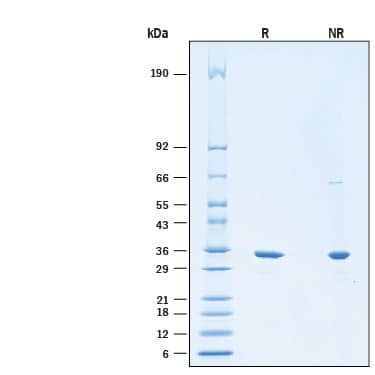Recombinant S. pyogenes IdeS His-tag Protein, CF Summary
- R&D Systems E. coli-derived Recombinant S. pyogenes IdeS His-tag Protein (11341-ID)
- Quality control testing to verify active proteins with lot specific assays by in-house scientists
- All R&D Systems proteins are covered with a 100% guarantee
Product Specifications
Asp30-Asn339, with an N-terminal Met and C-terminal 6-His tag
Analysis
Product Datasheets
Carrier Free
CF stands for Carrier Free (CF). We typically add Bovine Serum Albumin (BSA) as a carrier protein to our recombinant proteins. Adding a carrier protein enhances protein stability, increases shelf-life, and allows the recombinant protein to be stored at a more dilute concentration. The carrier free version does not contain BSA.
In general, we advise purchasing the recombinant protein with BSA for use in cell or tissue culture, or as an ELISA standard. In contrast, the carrier free protein is recommended for applications, in which the presence of BSA could interfere.
11341-ID
| Formulation | Supplied as a 0.2 μm filtered solution in Tris and NaCl. |
| Shipping | The product is shipped with polar packs. Upon receipt, store it immediately at the temperature recommended below. |
| Stability & Storage: | Use a manual defrost freezer and avoid repeated freeze-thaw cycles.
|
Assay Procedure
- Assay Buffer: 25 mM Sodium Phosphate, 150 mM NaCl, pH 7.5
- Recombinant S. pyogenes IdeS (rS.p Ides) (Catalog # 11341-ID)
- Purified Human IgG (Catalog # 1-001-A)
- 15% SDS-PAGE gel
- Reducing Sample Buffer
- Gel Staining Reagent
- Prepare a curve of rS.p Ides by diluting rS.p Ides to 200, 50, 12.5, 3.125, 0.781, 0.195, and 0.049 µg/mL in Assay Buffer.
- Dilute Human IgG to 200 µg/mL in Assay Buffer.
- Combine 20 µL of each rS.p Ides curve dilution and 20 µL of 200 µg/mL Human IgG.
- Include a control by combining 20 µL of 200 µg/mL Human IgG and 20 µL Assay Buffer.
- Incubate reaction mixtures and control at 37 °C for 30 minutes.
- Combine each 10 µL reaction mixture (including controls) with 10 µL of Reducing Sample Buffer. Heat at 95 °C for 3 minutes.
- Load entire volume of each reaction mixture (20 µL) per lane onto a 15% SDS-PAGE gel and perform electrophoresis.
- Stain gel and analyze the percent digestion of Human IgG using densitometry for each rS.p Ides curve dilution.
- Determine the DC50 by plotting % digestion vs rS.p Ides concentration (ng) using 4-PL fitting.
- rS.p Ides: 1000, 250, 62.5, 15.6, 3.9, 0.98, 0.24, and 0 ng
- Human IgG: 1 µg
Scientific Data
 View Larger
View Larger
2 μg/lane of Recombinant S. pyogenes IdeS His-tag Protein (Catalog # 11341-ID) was resolved with SDS-PAGE under reducing (R) and non-reducing (NR) conditions and visualized by Coomassie® Blue staining, showing bands at 32-35 kDa.
Reconstitution Calculator
Background: IdeS
IdeS from Streptococcus pyogenes, originally known as Mac-1, is a unique cysteine protease secreted in mature active form with a high degree of specificity for IgG. The structure of IdeS resembles features of the papain cysteine protease family with two distinct domains that interact through a polar interface containing an active site catalytic triad (1). However, IdeS is unique in that it does not contain disulfide bonds or a propeptide and has a RGD motif, known to be important for recognition by integrins (1). Studies have also found IdeS can inhibit neutrophil effector production of reactive oxygen species to repress immune responses in addition to performing IgG hydrolysis (2). IdeS digests all subclasses of human, and some classes of monkey, rabbit and sheep IgG with limited activity on mouse IgG2a and IgG3. IdeS digests IgG at a specific defined site between two glycines in the lower hinger region of the IgG heavy chain generating a homogenous pool of F(ab‘)2 and Fc/2 fragments. The lower hinge region is implicated as being important for Fc receptor recognition and complement binding (2-4). The high specificity and generation of homogeneous products has led to development of analytical strategies utilizing IdeS to characterize monoclonal therapeutic antibodies and related products such as antibody-drug conjugates, Fc-fusion proteins and bispecific antibodies (5). Additionally, animal models have provided significant proof of concept for use of IdeS as a therapeutic in treatment of IgG-mediated autoimmune diseases leading to some success using IdeS in clinical trials (2, 6).
- Wenig, K. et al. (2004) PNAS 101:17371.
- von Pawel-Rammingen, U. (2012) J. Innate. Immun. 4:132.
- Radaev, S. and P. Sun (2002) Mol. Immunol. 38:1073.
- Hulting, G. et al. (2009) FEMS Microbiol. Lett. 298:44.
- Sjogren, J. et al. (2016) Analyst 141:3114.
- Klontz, E.K. (2022) Transfus. Med. Rev. 36:246.
FAQs
No product specific FAQs exist for this product, however you may
View all Proteins and Enzyme FAQsReviews for Recombinant S. pyogenes IdeS His-tag Protein, CF
There are currently no reviews for this product. Be the first to review Recombinant S. pyogenes IdeS His-tag Protein, CF and earn rewards!
Have you used Recombinant S. pyogenes IdeS His-tag Protein, CF?
Submit a review and receive an Amazon gift card.
$25/€18/£15/$25CAN/¥75 Yuan/¥2500 Yen for a review with an image
$10/€7/£6/$10 CAD/¥70 Yuan/¥1110 Yen for a review without an image
